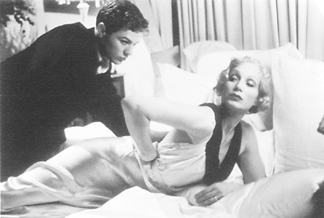Class Dismissed
Altman Sides With the Servants in 'Gosford Park'
By Patrick Reed

Ryan Phillippe and Kristin Scott Thomas
At seventy-six, Robert Altman remains one of the few directors from the late-60s/early-70s renaissance era of American movies that still has something substantial to offer for contemporary audiences. While Coppola is refurbishing a past glory (Apocalypse Now Redux), Lucas is casting N-Sync for bit roles in the next Star Wars (to better woo the Titanic teen mob, I suppose - sounds splendid!), Altman, along with Scorsese and Spielberg, but with far-smaller budgets as always, is still churning out pictures on a fairly regular basis. Although his recent films have garnered modest attention, in the early 90s Altman worked wonders by reviving his trademark broad-canvas approach - first employed in M*A*S*H (1970) and expanded exponentially in the gargantuan 70s-malaise epic Nashville (1975) - for Short Cuts (1993). With Cuts, Altman adapted several Raymond Carver short stories to create a sweeping, sometimes funny, but more often unsettling vision of modern alienation. Almost a decade later, Altman has again returned to the large-cast, character-driven, multiple-story format that made Short Cuts so successful.
Gosford Park shares attributes with Altman's previous work, but also breaks new ground. A recent public TV appearance by Altman and British screenwriter Julian Fellowes revealed that they initially wanted to explore the ways people with very different backgrounds interact when living together in close proximity, and so decided to utilize the time-honored "master-servant" juxtaposition. This in turn led the creators to look toward England as an ideal location for the story, instead of Altman's Horatio Alger-lovin' homeland. Truth be told, Altman had already skewered the U.S. enough for its self-denial about social stratification - in Short Cuts, Nashville, and even in his acme, the ultimate anti-Western McCabe and Mrs. Miller (1971). The English class divide, on the other hand, has always been ripe for cultural inspection - start with the Bard, and then move on through Dickens, "God Save the Queen" (trad. and Sex Pistols versions), "Upstairs, Downstairs," and, of course, Royal Family tabloid fodder (current outrage: the pot-smoking prince). Held up against such a long tradition, one would think that a new movie about aristocrats and their underlings would have to be very unique, and expertly executed, to stand out.
Set in the early 30s, Gosford Park takes its name from a pastoral manor belonging to Sir William McCordle (Michael Gambon), a wealthy factory baron prone to booze-induced tantrums and incessant adultery. A large weekend soiree, replete with lavish meals and pheasant hunting, has been arranged by Lady Sylvia McCordle (Kristin Scott Thomas), and among the elites invited are Lady Sylvia's aunt, the Countess of Trentham (Maggie Smith) and the famous British actor Ivor Novello (a real-life, silent-era thespian, played here by Jeremy Northam). All of the guests are customarily assigned servants by the hosts, a rather degrading process which entails that the maids and valets must assume the names of their employers for the weekend. Once all of the formal connections become established, Altman and Fellowes commence to slowly uncover the complex, often tempestuous relationships between many different characters, focusing primarily on the long-term effects a life full of rigid class hierarchy can have on a person's emotional state - and it isn't surprising that Altman's sympathies generally lie with the servants. There's a thread of a central plot, involving a murder during the second night, but this isn't an Agatha Christie homage; the most engaging thing about Gosford Park is that, as happens often in Altman's films, here the plot progression merely serves as an impetus for human interaction.
Actually, there are so many characters in Gosford Park that several fail to make much of an impression, especially on the upper-class side of the ledger. What is impressive is how well so many of them do register: Maggie Smith's comic timing is diamond-sharp as the Countess, but there are other fine performances in this stellar cast, ranging from Emily Watson (amazing in 1996's Breaking The Waves) as a forlorn and fed-up housemaid to Clive Owen (2000's indie hit Croupier) as a taciturn valet with a grudge to settle. (Quickly count off ten esteemed Brit actors, the first ones that come to mind. Chances are, at least three - maybe four - appear in this film.) Despite grand production design and typically astute, "Altman-esque" overlapping dialogue and roving camerawork, Gosford falls a bit short the director's previous best - one nagging problem is its often-striking similarity to Jean Renoir's The Rules of the Game (1939), in which Renoir's examination of many of the same class issues manages to meld humor and heartbreak in a more subtle and therefore more effective fashion. Still, Gosford Park is Altman's best in quite a while, and overall a welcome return to near-top form for one of America's most singular filmmakers.
HOME | THIS ISSUE | ACE ARCHIVES